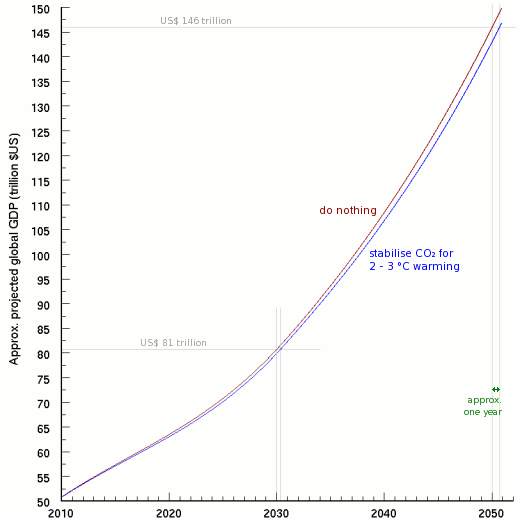Dealing with global warming … slowly

I’ve been trying to set aside time to read the summary of the IPCC third working group (nevermind the full report of the first), released last Friday to a fairly minimal media fanfare that really only covered one aspect of the not-exactly-surprising report. To explain what they didn’t: the available econometric modelling indicates that if a “stringent” emissions regime is introduced, world overall growth will be slowed down by about one year (i.e. it’ll take an extra year to get to the same GDP level as we would without any emissions controls). And that’s not even counting possible benefits like reduced health costs.
Interestingly, their work shows that if a cost is attached to carbon, some of the biggest potential savings in emissions will come from improved agriculture (particularly rice, which is currently farmed quite unsustainably) and from more efficient building systems (lighting, air conditioning, etc.).
Here in Perth, Alan Carpenter tried to ride on the report’s coattails by announcing his own “climate change” policy in the form of a new set of house building rules. But instead of dovetailing with the IPCC’s suggestions, he gave us a policy that’s barely better than what the federal Liberals have been offering.
Perhaps because of cries of wolf from the house-building industry, the new “Five Star Plus” rules are a lame shadow of the New South Welsh BASIX strategy that we were supposed to get. They comprise several rules to help save water (basically, requiring water-saving devices rather than just subsidising their cost) but do little to save energy — there’s no mention of air conditioner efficiency, or of orienting new houses to suit the sun.
There is some talk of a 15% renewable energy goal, which is nice … except that it’s not until 2020, and as far as I can tell it’s not a binding target. Yay for taking the low road and leaving actual leadership to other parts of the world.
I’m reminded of a lovely phrase from the IPCC report: “resistance by vested interests may make [changes] difficult to implement”.






[...] than that, most of the announcements aren’t new: the environmental measures announced earlier this week will cost a ridiculously generous $20 million per [...]
[...] “budget WTF” category: the $100 million over five years that the Premier promised to deal with climate change looks all the more feeble when you realise that $88 million is to be spent in the next 12 months on [...]
[...] this light, consider two State policies announced on Sunday against the climate change tokenism of the WA government: NSW shall be buying clean-fuel buses (done here years ago), while Queensland [...]